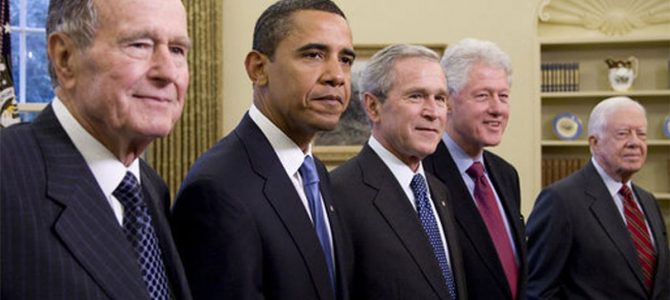
Two months before Election Day, Hillary Clinton tweeted: “the choice in this election is about who will have the power to shape our children for the next four years of their lives.” It was, I thought at the time, an insanely totalistic view of the president’s role, as well as a rotten thing to tell expectant parents, who’d spent a whole summer worried about the Zika virus.
Still, many of our fellow citizens share Clinton’s perspective, judging by the onslaught of post-election columns with titles like: “Donald Trump is our next president. What do we tell the children?” Apparently, that’s what a lot of parents are asking themselves—or their therapists—in the wake of Donald Trump’s startling victory.
Daniel Griffin, a D.C.-area psychologist, told the Washington Post that “many patients were walking into his office ‘shellshocked,’” wondering what they could possibly say to their little ones. “It never really hits you in the gut until you think about your own kids,” Will Bunch broods in the Philadelphia Inquirer, concluding that his son (age 22) and daughter (“24 and starting grad school”) were ready for the harsh truth: “Resist him.”
‘We Need to Talk about Donald’
There’s no doubt that “what do we tell the children?” is a genuinely difficult and wrenching question for some parents. Undocumented immigrants whose families face a greater risk of deportation, for example, or Muslim-Americans worried about increased fearmongering and public hostility, have good reason to think about how much their kids can handle at what age.
For most families, however, the “conversation” needn’t be so fraught with angst. It might even be the occasion for a valuable lesson: Tell your kids the truth: the president can be a bad person, even a terrible one. You don’t have to admire him if he doesn’t deserve it. And just because he’s a creep doesn’t mean it’s okay for you to be one too.
Up to a certain age, belief in Santa Claus is charming, and entirely harmless. Blind faith in presidential benevolence is neither. If you’re teaching your kids that the president reliably tells the truth and does the right thing, then the future citizens you’re raising may turn out gullible and easily led.
Why lie to them? After all, in living memory, presidents have conducted themselves abominably in their personal relationships, lied us into war, and, in former Nixon aide John Dean’s memorable phrase, “use[d] the available federal machinery to screw [their] political enemies.” Trump, who seems positively gleeful about the prospect of turning the federal machinery against his enemies, seems unlikely to set a higher standard of presidential character.
In a more innocent time, Americans raised their children to look up to the president—and they did. The political scientist Fred Greenstein interviewed hundreds of grade-schoolers for a 1960 article in the American Political Science Review, “The Benevolent Leader: Children’s Images of Political Authority.” The children evinced “strikingly favorable” attitudes toward political leaders, especially the president.
In fact, Greenstein found it almost impossible to elicit any skepticism from the children he interviewed, despite “a variety of attempts to evoke such responses.” Far more typical were statements like “[the president] gives us freedom” and “he has the right to stop bad things before they start.”
That pattern of “juvenile idealization of the President” persisted in subsequent studies of children throughout the 1960s. Nor was it limited to juveniles: writing in 1970, presidential scholar Thomas Cronin observed that even college students’ textbooks of the era offered a comic-book vision of presidential “omnipotence” and “moralistic-benevolence.” “The student learns that the presidency is ‘the great engine of democracy,’ the ‘American people’s one authentic trumpet’”; moreover, “if, and only if, the right man is placed in the White House, all will be well, and, somehow, whoever is in the White House is the right man.”
Putting away Childish Things
Americans grew up fast in the years that followed, however. Throughout the early 1970s, the public learned that presidents had lied about Vietnam, turned intelligence agencies against U.S. citizens, and abused their powers for political gain. Americans came to grips with the revelation that their president, our national father figure, could be a foul-mouthed, [expletive deleted] crook.
H.R. Haldeman, Nixon’s chief of staff, saw what was coming as early as 1971: warning the president about the effect of the Pentagon Papers leak: “the implicit infallibility of presidents, which has been an accepted thing in America, is badly hurt by this, because it shows that people do things the President wants to do even though it’s wrong, and the President can be wrong.”
By the mid-‘70s, even children had abandoned the childish belief in “the implicit infallibility of presidents”: subsequent surveys of grade-schoolers revealed that kids no longer viewed the president as an unambiguously benevolent leader. So too with later generations of American kids: in a 2002 study following Greenstein’s methodology, fourth through eight graders were “willing to grant importance to the office of the presidency, yet they are not willing to give unconditionally positive evaluations of the president.” The authors found “a consistent cynicism regarding the individual person of the president observable throughout all of the grade levels.”
For nearly eight years, President Obama has waged a War on Cynicism from the bully pulpit, railing against “those who question the scale of [government’s] ambitions,” and telling college students to reject the “voices” that “warn tyranny is lurking just around the corner.” Somehow, what the president decried as “cynicism” always sounded like healthy skepticism toward increased federal power. In Trump’s case, even Obama might be starting to appreciate the “cynics’” point.







